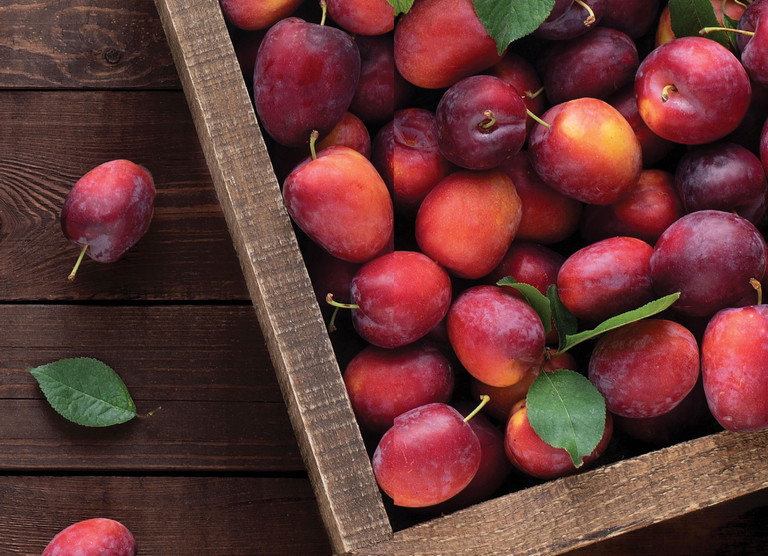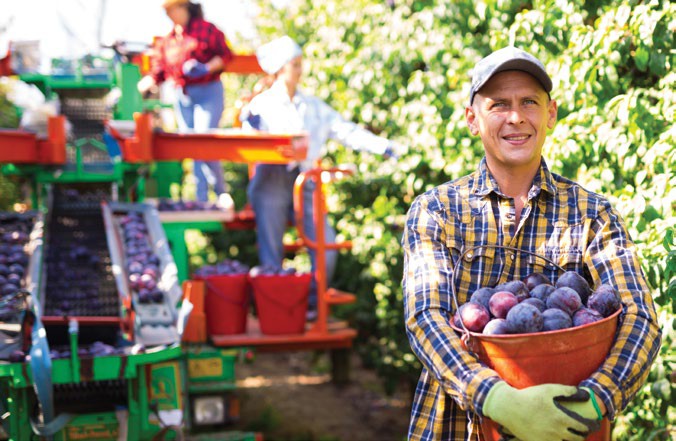
That’s a wrap
As the 22/23 stonefruit season nears its end, we chat with committee chair Danny Di Marco about the year that was and the big issues ahead.
A cool start to spring and summer started the stonefuit season off slowly, running behind by four to five days. Crop loads saw plums on the heavy side, while nectarines and peaches were around 10 to 20 per cent down. And while the season is expected to wrap up a little earlier than usual (by the first week of April, rather than the end), the season has pumped out some great tasting fruit. What we lost in quantity was won back in taste.
“The quality of fruit has been really good this year,” says Danny Di Marco, chair of Stonefruit WA. “We avoided the rains they had over East, thankfully, and enjoyed our Mediterranean climate. We had perfect growing weather in the Perth Hills, and down south (Ballingup and Donnybrook) had great weather, too.
What were the greatest successes this season?
“I think one of the greatest successes is that a lot of the growers have invested in new varieties. And those trees are starting to get into production. These varieties come from all around the world, such as from California, Spain and France. They are regarded as the best eating qualities, and we're really getting those qualities right. There are many sweet varieties coming through from California, particularly, such as Honey Gem and Honey Fire, to the Polar varieties, which are white flesh nectarines, such as Polar Snows and Polar Bears.
“Another positive is the public support for locally grown fruit. WA doesn’t have to be reliant on trucking in stonefruit from Melbourne or Sydney, which is long distance and opens us to the dangers of introduced pests, such as Qfly. Both have negative impacts. As an example, most fruit grown in Western Australia is picked in the morning, packed in the afternoon and it can be in the shops the following day. You can’t replicate that when trucking in fruit from the Eastern States.”
“ A lot of growers are now asking: how dinkum is the West Australian Government in keeping its growers viable. One way of doing that is through making sure that energy costs are not passed on. ”
What are the key concerns for 23/24?
Energy costs
“I think it's very important that governments understand that if they want food security, especially the West Australian Government, they've got to be thinking about making energy cheaper for growers because growers are at the bottom of the barrel. And, of course, we can't pass those costs on. It's detrimental to the industry in the sense that growers are going to get out if they can’t recoup those costs. With a loss of growers, the State’s carbon footprint will rise due to bringing in fruit from overseas and over East. We need to keep our local growers going. A lot of growers are now asking: how dinkum is the West Australian Government in keeping its growers viable. And one way of doing that is through making sure that energy costs are not passed on to growers because they can't pass it onto anybody else.”
No national buying strategies
“We need to make the major retailers understand the issues in growing fruit in individual states and not adopt a national buying strategy. The situation in Western Australia is different to Melbourne and Sydney. Over East, the markets (Brisbane, Melbourne, Sydney) are closer. Due to our isolation, we need to ensure our industry remains viable so that local growers can keep producing – our location is a unique situation in Australia and the major retailers need to understand that.”
Introduce incentives to bring young growers into the industry
“Another important factor is getting young people back into the industry. And that's important because, let's face it, the majority of the farms that supply the retailers are small family-run operations that have been going for 70-80 years with ageing operators. Encouraging the next generation is definitely something that government and other stakeholders, including ourselves, need to collectively tackle if we still want to have growers supplying the local market. The average age of the orchardist is in their sixties. There needs to be more incentives to keep the family farm going because a vibrant agricultural industry is going to benefit the State.”
Entice backpackers into the State
“We need to ensure that we’ve got enough workers. Backpackers are starting to come back. We’re in the metro area, so it's not too bad. However, up north, it is an issue. The government has done a good job to improve the situation, but it’s still not where it was pre-Covid.”

How do we navigate carbon footprint goals?
“The most important issue on the table today from the feedback I get from growers is the concern about what's happening with the push to lower our carbon footprint. At the moment there is no official target and there is a lot to be clarified. These unknowns are causing insecurities and uncertainties. We are talking about family farms that have taken 89 years to build up their machinery to the level that they need for their operations. Now we hear we may need to make changes within the next three or four years and that's a concern. There's a lot of uneasiness about how that is going to happen and the costs involved when the viability of our industry is already a major concern.”
Nurture a return of the export market
“We need to get export going again. Since Covid, export has largely disappeared. We have lost a few markets in Jakarta and other places where we were making inroads up until Covid impacted air freight and shipping costs. It is difficult to start it up again, so export needs a big push to get that going again.”
“ The average age of the orchardist is in their sixties. There needs to be more incentives to keep the family farm going because a vibrant agricultural industry is going to benefit the State. ”
Queensland Fruit Fly
Queensland fruit fly (Qfly) has been detected in Bayswater. Qfly is a serious horticulture pest, which – with more than 300 species of fruit and vegetable host plants – could impact us all. The Department of Primary Industries and Regional Development (DPIRD) is on to it, working to prevent its spread. The Qfly were detected in surveillance traps, as part of DPIRD’s early warning biosecurity system. According to DPIRD Chief Plant Biosecurity Officer Sonya Broughton, department staff were trapping, inspecting and baiting host plants on nearby street trees and verges near the Qfly detection. “Our staff have experience in responding effectively to Qfly detections, having eradicated incursions from Perth eight times since the 1980s, most recently in Dalkeith, Claremont and Nedlands in 2020 and Coolbellup in 2021 thanks to the cooperation of local communities,” says Sonya. ●
MORE INFORMATION
Contact Danny Di Marco via email on dimarconsno@gmail.com.